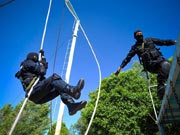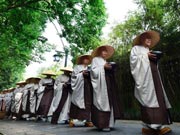

Students train at the Luolan Pole Dance School in Beijing.
Bad reputation
She recalled that when she organized the first national contest in Beijing in 2007, some critics complained that she was running illegal, obscene shows, an allegation that forced a handful of contestants to shun post-contest interviews to avoid being exposed to their families.
Song Yao, an accomplished pole dancer who graduated from Luo's school in 2010, kept her training secret from her parents in her native Sichuan province for two years. She only owned up after she came in second in the China Pole Dance Championships in 2011 and the resultant publicity made it impossible to conceal her profession. "My parents are a traditional couple. They wouldn't approve of such sensual practices," she said.
Despite the disapproval of seniors, pole dancing has a better reputation in China than in Western countries. "Actually, a lot of Chinese people haven't heard of pole dancing, because they don't have strip clubs in China. When pole dancing first arrived, most people just respected it as a new form of exercise, with no seedy connotations," said Cicilia Yang, the Canadian-Chinese owner of the Cat Dance Studio, which offers pole-dancing courses.
Any raised eyebrows in China are more likely to be prompted by the skimpy costumes than the dancers' suggestive movements, but Luo said the outfits are designed to meet the technical demands of friction between flesh and metal rather than for any sexual intent.
Moreover, sexually provocative moves are strictly banned at competitions held in China, where a clear line is drawn between serious contests and titillation.
 |  |
Day|Week

 Breathtaking buildings of W. Sichuan Plateau
Breathtaking buildings of W. Sichuan Plateau Graduation photos of "legal beauties"
Graduation photos of "legal beauties" Top 10 most expensive restaurants in Beijing in 2015
Top 10 most expensive restaurants in Beijing in 2015 Special police force conducts multi-subject training in Urumqi
Special police force conducts multi-subject training in Urumqi 'Floating girls' in cheongsam
'Floating girls' in cheongsam Mysterious crater discovered in central China’s Hubei
Mysterious crater discovered in central China’s Hubei 630 monks walk for charity in Hangzhou
630 monks walk for charity in Hangzhou Glaciers on Qilian Mountains shrink 36 square km over 10 yrs
Glaciers on Qilian Mountains shrink 36 square km over 10 yrs